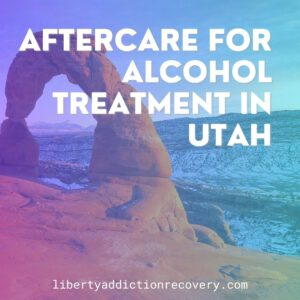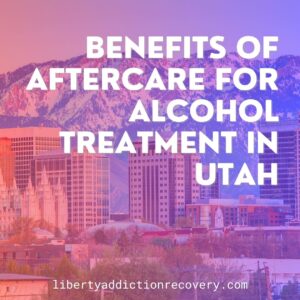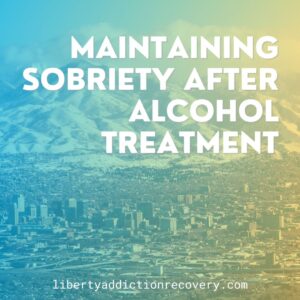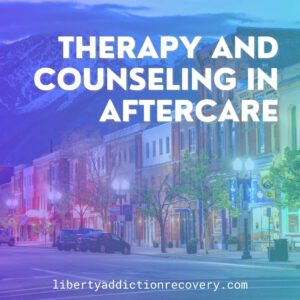 Alcohol addiction is a chronic disease that can be challenging to overcome. While alcohol treatment programs in Utah can help individuals achieve sobriety, maintaining long-term recovery requires ongoing support and aftercare for alcohol treatment in Utah.
Alcohol addiction is a chronic disease that can be challenging to overcome. While alcohol treatment programs in Utah can help individuals achieve sobriety, maintaining long-term recovery requires ongoing support and aftercare for alcohol treatment in Utah.
Aftercare and continued support are critical components of alcohol treatment that can help individuals navigate the challenges of sobriety and prevent relapse. Through participation in aftercare programs, individuals can receive ongoing support, guidance, and resources to support their recovery journey.
Key Takeaways: Aftercare for alcohol treatment in Utah
- Alcohol treatment programs in Utah are essential for achieving sobriety.
- Aftercare and continued support are crucial for long-term recovery.
- Aftercare programs provide ongoing support, guidance, and resources for individuals in alcohol recovery.
Understanding Aftercare for Alcohol Treatment in Utah
Alcohol addiction is a complex and challenging disorder that requires ongoing care and support to achieve lasting recovery. While inpatient and outpatient treatment programs are essential first steps towards sobriety, it is the aftercare that plays a critical role in helping individuals maintain their progress and prevent relapse.
Aftercare for alcohol treatment refers to the ongoing support and treatment that individuals receive after they complete their initial rehab program. This can include a range of services, such as counseling, therapy, support groups, and medication management, among others.
Many people underestimate the importance of aftercare in alcohol treatment. However, research has shown that individuals who participate in aftercare programs are significantly more likely to maintain their sobriety and avoid relapse than those who do not.
Why Aftercare is Crucial for Long-Term Recovery
Overcoming alcohol addiction is a lifelong process that requires ongoing commitment and support. Aftercare provides individuals with the tools and resources they need to manage their triggers, cope with stress and anxiety, and maintain their motivation to stay sober.
Without aftercare, individuals may be more likely to experience a relapse, as they may not have the necessary support and guidance to navigate the challenges of recovery.
Furthermore, aftercare can help individuals address any underlying mental health conditions that may contribute to their addiction, such as depression, anxiety, or trauma. By addressing these co-occurring conditions, individuals can improve their chances of achieving lasting recovery and improving their overall quality of life.
 Benefits of Aftercare for Alcohol Treatment in Utah
Benefits of Aftercare for Alcohol Treatment in Utah
Aftercare programs play a crucial role in the recovery process for individuals seeking treatment for alcohol addiction. These programs provide continued support and resources that are essential for maintaining sobriety and preventing relapse.
Some of the key benefits of aftercare for alcohol recovery include:
- Long-term support: Aftercare programs offer ongoing support that is necessary for individuals to sustain their recovery journey. This support can be in the form of group therapy, individual counseling, peer support groups, and more.
- Building coping skills: Aftercare programs can help individuals develop effective coping skills that enable them to handle difficult situations and triggers that may arise in their daily lives. This can include stress-management techniques, mindfulness practices, and other holistic approaches.
- Reducing the risk of relapse: With the continued support and resources provided through aftercare programs, individuals are better equipped to avoid relapsing and maintain their sobriety over the long-term.
- Improving overall well-being: Aftercare programs can contribute to an individual’s overall physical, mental, and emotional well-being. This can include improving relationships with family and friends, enhancing self-confidence and self-esteem, and improving overall quality of life.
- Providing a sense of community: Aftercare programs can provide individuals with a sense of community and belonging as they connect with others who are going through similar experiences. This sense of shared experience and support can be incredibly valuable for individuals in recovery.
It is important to note that the specific benefits of aftercare programs can vary depending on the individual and the program selected. However, the overall value of aftercare in alcohol recovery cannot be overstated.
Types of Aftercare for Alcohol Treatment in Utah
After completing alcohol treatment, individuals need continued support to maintain their sobriety and prevent relapse. In Utah, there are various aftercare programs available to help individuals achieve long-term recovery.
| Program Type | Description |
|---|---|
| Outpatient Programs | These programs offer ongoing therapy and counseling on a flexible schedule, allowing individuals to attend sessions while still fulfilling their work and family responsibilities. |
| Sober Living Homes | These group homes provide a sober and supportive living environment for individuals who have completed alcohol treatment. They offer group therapy, life skills training, and other supportive services. |
| 12-Step Programs | These programs, such as Alcoholics Anonymous (AA), provide a structured and supportive community for individuals in recovery. Members attend regular meetings and work through the 12 steps of recovery. |
| Individual Therapy | Individual therapy sessions with a licensed therapist can provide ongoing support for individuals who need additional guidance and coping skills to maintain their sobriety. |
It is important for individuals to carefully consider their aftercare options and choose a program that aligns with their needs and goals for recovery. Working with a professional can help them find the most suitable program and ensure ongoing support for their alcohol addiction recovery.
 Maintaining Sobriety after Alcohol Treatment
Maintaining Sobriety after Alcohol Treatment
Successfully completing alcohol treatment is a significant achievement, but it’s just the beginning of the recovery journey. Maintaining sobriety is an ongoing process that requires dedication and effort. With the right strategies and support, individuals can increase their chances of staying sober long-term.
Develop a Support System
A strong support system is crucial for maintaining sobriety. This can include family, friends, and support groups such as Alcoholics Anonymous. Consider reaching out to people who are positive influences and who can provide encouragement during challenging times.
Practice Self-Care
Self-care is an essential component of recovery. Taking care of physical, emotional, and mental health can help individuals avoid triggers and maintain sobriety. Some self-care strategies include exercise, mindfulness, getting enough sleep, and practicing relaxation techniques.
Stay Busy
Idleness can be a trigger for relapse, so it’s important for individuals to stay active and engaged in meaningful activities. This could be pursuing a new hobby, volunteering, or focusing on career and personal goals.
Avoid High-Risk Situations
Avoiding high-risk situations is critical for individuals in recovery. This could include staying away from people who use alcohol or drugs, places associated with alcohol use, or situations that could trigger cravings. It may also be helpful to develop a plan for dealing with high-risk situations.
Be Honest and Accountable
Honesty and accountability are essential for maintaining sobriety. Being honest with oneself and others about the challenges of recovery can help individuals maintain focus on their goals and prevent relapse. Additionally, seeking help when needed and being accountable to a support system or sponsor can provide additional motivation and guidance.
 Role of Support Groups in Aftercare for Alcohol Treatment in Utah
Role of Support Groups in Aftercare for Alcohol Treatment in Utah
Support groups play a critical role in the aftercare process for individuals seeking recovery from alcohol addiction. These groups provide an opportunity for individuals to connect with others who are going through similar experiences, share their stories, and offer support and encouragement to one another.
There are a variety of support groups available in Utah, including Alcoholics Anonymous (AA), SMART Recovery, and Celebrate Recovery. Each group has its own unique approach and philosophy, but all aim to create a safe and supportive environment for individuals in recovery.
Alcoholics Anonymous (AA)
AA is one of the most well-known support groups for individuals in recovery from alcohol addiction. The group follows a 12-step program that includes admitting powerlessness over alcohol, making amends for past wrongs, and helping others in recovery.
AA meetings are typically held in a group setting and provide a space for individuals to share their experiences, struggles, and successes in recovery. Members are encouraged to sponsor and support one another, creating a strong sense of community and accountability.
SMART Recovery
SMART Recovery is a science-based approach to recovery that emphasizes self-empowerment and self-reliance. The program incorporates cognitive-behavioral therapy techniques to help individuals identify and change negative thought patterns and behaviors related to alcohol addiction.
SMART Recovery meetings are focused on discussing specific tools and strategies for coping with cravings, managing stress, and avoiding relapse. The program also offers online resources and support groups for individuals who may not have access to in-person meetings.
Celebrate Recovery is a Christian-based support group that combines the 12-step program with biblical teachings and principles. The group aims to provide a safe and supportive environment for individuals to explore their faith and address the spiritual aspects of addiction.
Celebrate Recovery meetings include worship, prayer, and Bible study in addition to sharing and support sessions. The group emphasizes the importance of forgiveness, grace, and redemption in the recovery process.
Overall, support groups can be a valuable source of ongoing support and encouragement for individuals in recovery from alcohol addiction. By connecting with others who have similar experiences and challenges, individuals can gain a sense of community and accountability that can help them maintain their sobriety over the long term.
Therapy and Counseling in Aftercare
Therapy and counseling are key components of aftercare programs for individuals who have completed alcohol treatment programs. These programs provide a safe and supportive environment where individuals can address underlying emotional issues and develop coping strategies to maintain sobriety.
One common type of therapy used in aftercare programs is cognitive-behavioral therapy (CBT). CBT focuses on identifying and changing negative thought patterns and behaviors that contribute to addiction. In aftercare, CBT can help individuals develop healthy coping mechanisms and prevent relapse.
Other types of therapy that may be utilized in aftercare programs include interpersonal therapy, which focuses on improving communication and interpersonal relationships, and psychoanalytic therapy, which aims to uncover deep-seated emotional conflicts that contribute to addiction.
Counseling is another important component of aftercare programs. One-on-one counseling sessions with a licensed therapist can provide a safe and confidential space for individuals to discuss their struggles and receive emotional support. Group counseling sessions can also be beneficial, as they provide opportunities for individuals to connect with others in recovery and share their experiences.
Overall, therapy and counseling are crucial components of aftercare programs for alcohol addiction. They provide individuals with the tools they need to maintain sobriety and achieve long-term recovery.
Holistic Approaches to Aftercare for Alcohol Treatment in Utah
While traditional aftercare programs often involve therapy and support groups, more holistic approaches can also be effective in promoting long-term recovery. These approaches incorporate alternative therapies and practices that address the mind, body, and spirit.
One option for holistic aftercare is yoga and meditation. These practices can reduce stress and anxiety while promoting mindfulness and relaxation, which can be especially helpful for those in recovery. Additionally, acupuncture and massage therapy can ease physical discomfort and promote overall wellness.
Nutrition and exercise are also key components of holistic aftercare. Proper nutrition can help heal the body and support mental health, while regular exercise can improve physical health and reduce stress. Some aftercare programs offer nutrition counseling and exercise classes to support these goals.
Examples of Holistic Approaches
The following table provides examples of holistic aftercare approaches:
| Approach | Description |
|---|---|
| Yoga and meditation | Practice of physical and mental exercises aimed at promoting mindfulness and relaxation. |
| Acupuncture | Practice of inserting needles into specific points on the body to alleviate physical discomfort and promote overall wellness. |
| Massage therapy | Practice of manipulating the body’s muscles and tissues to alleviate physical discomfort and promote relaxation. |
| Nutrition counseling | Educational program designed to help individuals make healthy food choices to support recovery. |
| Exercise classes | Group classes led by a certified fitness instructor aimed at promoting physical health and reducing stress. |
Holistic approaches can be an excellent supplement to traditional aftercare programs and can help individuals address their recovery needs in a more comprehensive way. Ultimately, the goal of holistic approaches is to promote overall wellness and provide individuals with a variety of tools and resources to support their recovery journey.
Family Involvement in Aftercare for Alcohol Treatment
Alcohol addiction is a family disease, meaning that it affects not only the individual struggling with alcohol use disorder but also their loved ones. As such, involving family members in the aftercare process can be extremely beneficial for ongoing recovery.
Family involvement in aftercare can take many forms, from attending support group meetings together to participating in family therapy sessions. These initiatives can help repair damaged relationships, rebuild trust, and create a supportive environment for the individual to continue their recovery journey.
During family therapy sessions, family members can learn more about the nature of addiction and acquire tools to support their loved one. They can also explore any underlying issues that may have contributed to the individual’s addiction, work towards forgiveness and repair, and establish healthy communication patterns.
Additionally, family members are encouraged to participate in support groups specifically designed for families of individuals struggling with addiction. These groups can provide a safe space to discuss challenges, share experiences, and learn from others who have experienced similar struggles.
Ultimately, family involvement in aftercare can support the individual in their recovery journey and contribute to a more positive outcome. It can also help the family as a whole to heal and grow stronger together.
Addressing Relapse in Aftercare
Relapse is a common occurrence in the recovery process, and it is important for individuals to understand that it does not mean failure. Instead, it can serve as a valuable learning opportunity and a chance to renew one’s commitment to sobriety. Aftercare programs can play a crucial role in helping individuals navigate and overcome setbacks in their recovery journey.
One of the most effective ways to address relapse in aftercare is through a relapse prevention plan. This plan involves identifying potential triggers and developing strategies to cope with them without turning to alcohol. These may include seeking support from a sponsor or attending a support group meeting, engaging in healthy activities such as exercise or meditation, or using stress-reduction techniques like deep breathing or visualization.
Cognitive-behavioral therapy (CBT) is another tool commonly used in aftercare to address relapse. CBT can help individuals identify negative thought patterns and behaviors that may lead to relapse, and develop more positive coping strategies. In addition, CBT can help individuals build resilience and self-efficacy, which can be crucial in maintaining sobriety over the long term.
It is also important to remember that relapse can have an emotional impact on both the individual and their loved ones. Family therapy or counseling can be a valuable resource in helping individuals address the emotional fallout of relapse and rebuild relationships that may have been strained.
Finding the Right Aftercare for Alcohol Treatment in Utah
When it comes to selecting an aftercare program in Utah, it’s essential to consider your individual needs and preferences. Not every program will be the right fit for you, so take the time to research and compare the available options.
One of the most critical factors to consider is the type of aftercare program that will best support your recovery. Some individuals may benefit most from intensive outpatient programs, while others may prefer less structured options like support groups or individual counseling sessions.
Another factor to consider is the location and accessibility of the aftercare program. Choose a program that is convenient for you to attend regularly, whether that’s close to your home, work, or other obligations.
It’s also important to consider any special needs or preferences you may have, such as seeking a program that incorporates holistic approaches or allows for family involvement.
Ultimately, finding the right aftercare program is about identifying the options that align with your unique needs and preferences. Consider reaching out to a healthcare provider or addiction specialist for guidance and recommendations in selecting the most suitable program for your individual needs.
Conclusion
Alcohol addiction is a challenging condition that requires a comprehensive approach to treatment. While detox and therapy are crucial components, aftercare and continued support can make all the difference in achieving lasting recovery.
By participating in aftercare programs, individuals can receive ongoing support and guidance as they transition back into their daily lives. These programs offer a variety of services, including therapy and counseling, support groups, holistic approaches, and family involvement, to help individuals sustain their sobriety and maintain their emotional well-being.
Relapse is a common occurrence in addiction recovery, and aftercare programs can help individuals address potential setbacks and continue making progress in their journey to recovery.
If you or someone you love is struggling with alcohol addiction, it is essential to seek professional help and explore the aftercare options available in Utah. Finding the right aftercare program can make all the difference in achieving long-term recovery and living a fulfilling, sober life.
Contact us for aftercare programs. We are here to help!
Check out our amazing reviews on Google.
FAQ – Aftercare for Alcohol Treatment in Utah
Q: What is aftercare in alcohol treatment?
A: Aftercare in alcohol treatment refers to the ongoing support and assistance provided to individuals after they have completed a formal treatment program for alcohol addiction. It aims to help individuals maintain their sobriety, prevent relapse, and promote long-term recovery.
Q: Why is aftercare important in alcohol treatment?
A: Aftercare is crucial in alcohol treatment because it provides continued support and guidance to individuals as they transition from a structured treatment environment back into their everyday lives. It helps them navigate challenges, develop healthy coping mechanisms, and build a strong foundation for lasting recovery.
Q: What are the benefits of aftercare for alcohol recovery?
A: Aftercare offers several benefits for individuals seeking alcohol recovery. It provides ongoing support, accountability, and access to resources that can help prevent relapse. It also offers a safe and understanding community of individuals who have similar experiences, fostering a sense of belonging and connection.
Q: What types of aftercare programs are available in Utah?
A: Utah offers a range of aftercare programs for alcohol recovery, including outpatient counseling, sober living homes, support groups, and therapy options. These programs vary in their structure, intensity, and approaches, allowing individuals to find the one that best suits their needs and preferences.
Q: How can individuals maintain sobriety after alcohol treatment?
A: To maintain sobriety after alcohol treatment, individuals can implement various strategies and practices. These may include attending support group meetings regularly, practicing self-care, engaging in healthy activities, setting and achieving goals, seeking therapy or counseling, and building a strong support network.
Q: What is the role of support groups in aftercare?
A: Support groups play a vital role in aftercare by providing individuals with a supportive and understanding community. They offer a platform for sharing experiences, receiving guidance, and developing connections with others who are going through similar challenges. Support groups can provide a sense of belonging and a space to learn from and support one another.
Q: How does therapy and counseling contribute to aftercare?
A: Therapy and counseling are essential components of aftercare programs as they provide individuals with the opportunity to address underlying emotional issues and develop healthy coping mechanisms. These sessions help individuals navigate the challenges of recovery, process past trauma, and acquire valuable tools for maintaining sobriety.
Q: What are holistic approaches to aftercare?
A: Holistic approaches to aftercare encompass alternative therapies and practices that complement traditional treatment methods. These may include yoga, meditation, art therapy, mindfulness exercises, and nutrition counseling. Holistic approaches focus on healing the mind, body, and spirit, promoting overall well-being and supporting long-term recovery.
Q: How can family members be involved in aftercare?
A: Family involvement plays a crucial role in aftercare. It provides support and understanding to individuals in recovery and helps strengthen family relationships. Family members can participate in therapy sessions, attend support groups, educate themselves about addiction, and create a supportive and understanding environment at home.
Q: How are relapses addressed in aftercare?
A: Relapse is a common occurrence in recovery, and aftercare programs are designed to address and help individuals overcome setbacks. Aftercare programs offer resources and tools to prevent and manage relapse, such as relapse prevention planning, identifying triggers, and providing ongoing support and guidance during challenging times.
Q: How can individuals find the right aftercare program in Utah?
A: To find the most suitable aftercare program in Utah, individuals can consider factors such as their specific needs, treatment preferences, location, and budget. It is recommended to research different programs, read reviews, consult with professionals, and reach out to program representatives to gather information and make an informed decision.

 Benefits of Aftercare for Alcohol Treatment in Utah
Benefits of Aftercare for Alcohol Treatment in Utah Maintaining Sobriety after Alcohol Treatment
Maintaining Sobriety after Alcohol Treatment Role of Support Groups in Aftercare for Alcohol Treatment in Utah
Role of Support Groups in Aftercare for Alcohol Treatment in Utah




